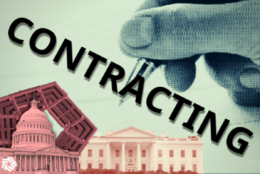Department of Homeland Security
-
The higher the employee response rate for FEVS, the more accurate the picture that chief human capital officers get into what their workforce both wants and needs. But for many agencies, it’s a challenging feat.
December 12, 2023 -
As the artificial intelligence phenomenon rolls on, the question emerges: What are the cybersecurity-attack implications of AI? Now Carnegie Mellon University's Software Engineering Institute has formed a team called the Artificial Intelligence Security Incident Response Team. It's working with sponsors in the Defense and Homeland Security Departments. For more, the Federal Drive with Tom Temin spoke with the Director of the CERT division of the Software Engineering Institute, Greg Touhill.
December 11, 2023 -
The Federal Protective Service is still facing steep staff shortages amid a rise in threats to government employees and facilities.
November 29, 2023 -
DHS's new Supply Chain Resilience Center will aim to marshal stakeholders to help avoid the type of shortages and bottlenecks that roiled the country during COVID-19.
November 28, 2023 -
Between newly introduced bipartisan legislation and guidance from OPM, military spouses are getting several possible avenues to more flexible employment in government.
November 24, 2023 -
The new office aims to bring more transparency and evidence-based decision-making to DHS, but it will require the buy-in of the department’s many components.
November 10, 2023 -
In today's Federal Newscast: Bain Capital has bought consulting firm Guidehouse for $5.3 billion. There’s new leadership at one of the largest federal law enforcement employee groups. And the head of the Pentagon office responsible for investigating UFOs has identified retirement as his next step.
November 09, 2023 -
Bloomberg Government predicts record contract spending, once Congress passes appropriations bills for 2024. It sees $762 billion in total procurement, including $113 billion for professional services. With how companies need to prepare, Federal Drive Host Tom Temin turned to federal sales and marketing consultant Larry Allen.
November 07, 2023 -
Eric Hysen, the DHS chief information officer, and Dana Chisnell, the director of CX, are expanding their priorities areas to include more customer and employee experience goals as outlined in a new IT strategic plan.
November 06, 2023 -
Jeff Rezmovic, the nominee to serve as DHS CFO, wants to get the department's financial management off GAO's high-risk list once and for all.
November 02, 2023 -
DHS plans to use its own approach for evaluating contractor cybersecurity rather than adopting the Pentagon's CMMC program.
November 01, 2023 -
Eric Hysen, the agency’s chief information officer and first chief AI officer, said the goal is to give employees access to new tools and technologies to deal with the ever-growing number of challenges the agency faces.
November 01, 2023 -
There is now more cyber guidance than ever for the companies that do business with the government. You can also expect even more when it comes to other new technologies, like artificial intelligence. Congress seems to be back up and running, and there is business to attend to. To start with, reauthorizing a major component of the Homeland Security Department, and also funding the rest of the government. For analysis, Federal Drive Executive Eric White spoke with Stephanie Kostro, Executive Vice President at the Professional Services Council.
October 31, 2023 -
In the endless quest for talent, federal contractors sometimes use foreign employees. A long-running program called E-verify lets employers confirm such potential employees are eligible to work in the United States. The Government Accountability Office (GAO) has found that agencies are not consistent in checking the E-verify system, as part of their contractor oversight.
October 25, 2023 -
DHS wants to make sure employees at the Counter Weapons Office of Mass Destruction stay feds, even if Congress lets the office's authority terminate.
October 24, 2023














